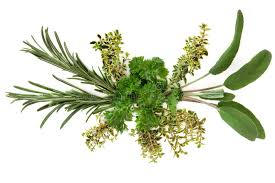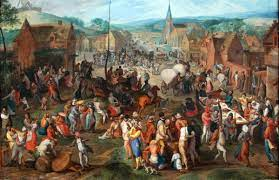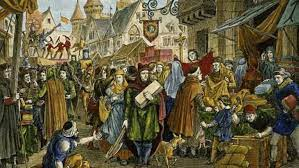
"Are you going to Scarborough Fair,
Parsley, Sage, Rosemary, and Thyme.
"Scarborough Fair" is a traditional English folk song from the Middle Ages, referring to an old fair in Scarborough, Yorkshire. It is a market fair, comprising of traders, merchants and other vendors that started sometime in the 14th century until the 18th century. A number of theories surround the song lyrics, especially the cooking spices - rosemary, sage, thyme, and parsley.
The use of the herbs "parsley, sage, rosemary, and thyme" in the lyrics has been debated and discussed. It's possible that they were just put there as a placeholder, as people forgot what the original line was. In traditional folk music, songs grew and evolved over time, as they were passed down through the oral tradition. That's the reason there are so many versions of so many old folk songs, and possibly why these herbs have become such a prominent part of the verse.

However, herbalists will tell you of the symbolism and functions of herbs in healing and health maintenance. There's also a possibility that these meanings were intended as the song evolved (parsley for comfort or to remove bitterness, sage for strength, thyme for courage, rosemary for love). There's some speculation that these four herbs were used in a tonic of some sort to remove curses.
The young man is dead as the four herbs of parsley, sage, rosemary, and thyme were once associated with death. The four herbs are ingredients for a love potion used by witches in medieval times. The mention of the herbs could also be simply to accommodate a line forgotten over time, thereby not really meaning anything in particular. However, the herbs, nonetheless, had serious associations back in the day.
Parsley was a symbol of evil and sorcery. Further associations have also been made with hell. Sage is thought to bring the blessings of a long life and possible immortality. There is also a reference to it warding off the effects of the evil eye. Rosemary is a great element of love and relationships. As such, it is the primary ingredient of love potions and eliminates love problems. Thyme, the final herb, is of an ethereal significance, believed to get you in touch with fantastic creatures and apparitions. A solid bringer of luck and exuding good vibes, it would also assist in searching for one’s true love.
Although the song, itself, is a song about jilted love, in that respect it has little value for us. However, it does contain lyrics which do have some historical significance. "Are you going to Scarborough Fair?/Parsley sage rosemary and thyme..." A good herbalist will tell you that Parsley isn't just for making a steak plate look good. It is an herb that is holistically used to treat indigestion.
However, during medieval times herbs were believed to have an equivalent spiritual benefit. Indigestion is frequently referred to as "heartburn" because as too many Americans know, it makes the chest hurt in the are near where the heart is found. Due to general lack of understanding the medical sciences, this feeling of indigestion often led folks to believe that their heart hurt. Thus, parsley was prescribed to heal the hurting heart.
The herb, Sage, has long been a symbol of strength. Rosemary represents faithfulness, love, and remembrance. The loving Greeks used to give sprigs of Rosemary to each other, and Greek brides traditionally wore a few sprigs of it in their hair on their wedding day. Rosemary, though, is usually symbolic of feminine love because this herb is very tough and strong, but it grows very slowly. Rosemary is also the symbol for prudence and sensibility. Ancient Roman doctors used to put Rosemary underneath the pillow of someone who had to perform a difficult mental job.
Parsley, Sage, Rosemary and Thyme Meaning
According to the website Songfacts, “Parsley was comfort, sage was strength, rosemary was love, and thyme was courage,” and thus these herbs “were important to the lyrics.”
- parsley : festive
- sage : wisdom
- rosemary :remembrance
- thyme : courage
It seems hard to justify why these particular herbs should be any more important to the song than any number of other herbs with other meanings, such as violet, for faithfulness, or myrtle for true love. As a matter of fact, there are many herbs associated with love and relationships. It is more likely that if these herbs had special associations, these associations may have changed based on place and time. Regardless, all the herbs had magical properties, themselves varied.
Parsley Magic
Parsley has been associated with an array of magical effects. It was long associated with evil and the Underworld, in fact, which doesn’t bode well for the song. However, it has also been used to ward off evil. It has been claimed that the origin of using parsley as a garnish on food was to keep the food from spoiling since spoilage was thought to be caused by evil spirits.
Sage Magic
Sage has been associated with quite an array of magical powers. It ensures a long life and, if you eat enough of it every day, perhaps even immortality. It brings wisdom and protects you from the evil eye. Perhaps more fitting for the song is the belief that if you write a wish on a sage leaf, and then sleep with the leaf under your pillow for three days, the wish will come true. Apparently, though, for your wish to come true you must dream of it. If your wish does not come true, you may come to some kind of harm. To prevent this harm you must bury the sage in the ground.
Rosemary Magic
Among its array of magical powers, rosemary has significance in relationships. It is a primary ingredient in love and lust potions, incenses, etc. It clears away past negativity in relationships and negativity and worry in general. It helps prolong relationships.
Thyme Magic
Thyme can put you in touch with fairies, spirits, ancestors, and all sorts of otherworldly beings. It brings luck, peace of mind, and all around good vibrations. But, perhaps its most important use is as a love herb. It helps you find your true love. It is said that if you feed it to the person whom you are attracted to, you will know for sure if they are your one true love. This use, of all the herbs mentioned in the song, fits perfectly with what the song is about, finding true love.
Are you going to Scarborough Fair?
Parsley, sage, rosemary, and thyme
Remember me to one who lives there
She once was a true love of mine
Tell her to make me a cambric shirt
Parsley, sage, rosemary, and thyme
Without no seams nor needle work
Then she'll be a true love of mine
Tell her to find me an acre of land
Parsley, sage, rosemary and thyme
Between the salt water and the sea strands
Then she'll be a true love of mine
Tell her to reap it with a sickle of leather
Parsley, sage, rosemary, and thyme
And gather it all in a bunch of heather
Then she'll be a true love of mine
The Romance Love Story behind ‘Scarborough Fair’
A theory from this site: Nantucket Today: “The four herbs highlighted in the song symbolize a complex love riddle compiled by a spurned lover. The “one who lives there” was supposed to figure it out. In the days of Scarborough Faire, herbs were prized primarily for medicinal value as well as their ability to ward off foul odors and dye cloth. Many herbs were assigned multiple meanings related to the various ills or problems they were supposed to cure. The love riddle in this case was designed to woo the lady back through the hidden meanings of parsley, sage, rosemary and thyme.”
I have no personal theory but found all of this interesting. According to good old Wikipedia: The ballad tells the tale of a young man, who tells the listener to ask his former lover to perform for him a series of impossible tasks, such as making him a shirt without a seam and then washing it in a dry well, adding that if she completes these tasks he will take her back. Often the song is sung as a duet, with the woman then giving her lover a series of equally impossible tasks, promising to give him his seamless shirt once he has finished.
As the versions of the ballad known under the title “Scarborough Fair” are usually limited to the exchange of these impossible tasks, many suggestions concerning the plot have been proposed, including the hypothesis that it is a song about the Plague. In fact, “Scarborough Fair” appears to derive from an older (and now obscure) Scottish ballad, The Elfin Knight (Child Ballad #2) which has been traced at least as far back as 1670 and may well be earlier. In this ballad, an elf threatens to abduct a young woman to be his lover unless she can perform an impossible task (“For thou must shape a sark to me / Without any cut or heme, quoth he”); she responds with a list of tasks that he must first perform (“I have an aiker of good ley-land / Which lyeth low by yon sea-strand”).
As the song spread, it was adapted, modified, and rewritten to the point that dozens of versions existed by the end of the 18th century, although only a few are typically sung nowadays. The references to “Scarborough Fair” and the refrain “parsley, sage, rosemary and thyme” date to nineteenth century versions, and the refrain may have been borrowed from the ballad Riddles Wisely Expounded, (Child Ballad #1), which has a similar plot.
Meaning of the Refrain
Much thought has gone into attempts to explain the refrain “parsley, sage, rosemary and thyme“, although, as this is found only in relatively recent versions, there may not be much to explain. The oldest versions of “The Elfin Knight” (circa 1650) contain the refrain “my plaid away, my plaid away, the wind shall not blow my plaid away” (or variations thereof), which may reflect the original emphasis on the lady’s chastity. Slightly younger versions often contain one of a group of related refrains :
- Sober and grave grows merry in time
- Every rose grows merry with time
- There’s never a rose grows fairer with time
These are usually paired with “Once she was a true love of mine” or some variant. “Parsley, sage, rosemary and thyme” may simply be an alternate rhyming refrain to the original. Folksong scholar Märta Ramsten states that folksong refrains containing enumerations of herbs - spices and medical herbs - occur in many languages. Parsley, sage, rosemary and thyme may also refer to the pagan belief, that when together, can be a love charm.
Scarborough is a small town on the coast of England. “Scarborough Fair” was a popular gathering in Medieval times, attracting traders and entertainers from all over the country. The fair lasted 45 days and started every August 15th. In the 1600s, mineral waters were found in Scarborough and it became a resort town. Today, Scarborough is a quiet town with a rich history.
In Medieval England, this became a popular folk song as Bards would sing it when they traveled from town to town. The author of the song is unknown, and many different versions exist. The traditional version has many more lyrics.
The lyrics are about a man trying to attain his true love. In Medieval times, the herbs mentioned in the song represented virtues that were important to the lyrics. Parsley was comfort, sage was strength, rosemary was love, and thyme was courage.



















No comments:
Post a Comment